Demand for monoclonal antibodies to treat COVID-19 is way up in the U.S., especially in the South.
Seven states make up 70 percent of orders for this therapy, which boosts the immune system’s ability to fight off Covid early in a patient’s infection.
These states are Alabama, Florida, Georgia, Louisiana, Mississippi, Tennessee, and Texas.
Many of these states have experienced recent surges, but residents have been hesitant to get vaccinated or take other precautions.
In order to better control supplies of this important treatment, the Department of Health and Human Services (HHS) will start managing its distribution while also purchasing more than one million additional doses.
About 2.17 million doses of the treatment have been distributed in the U.S. thus far.
The demand for monoclonal antibodies reveals the cost of treating Covid patients, as one dose of an antibody treatment costs over 100 times more than one dose of a vaccine.
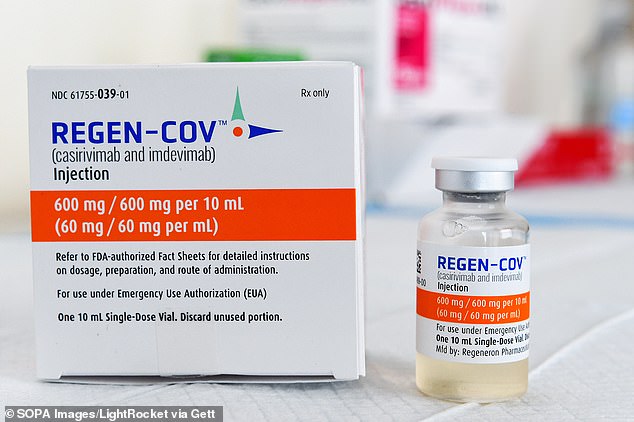
Demand is high for monoclonal antibody treatments like Regeneron, prompting the HHS to take over distribution. Pictured: A box and vial of the Regeneron treatment, in use at a Florida treatment site in August 2021
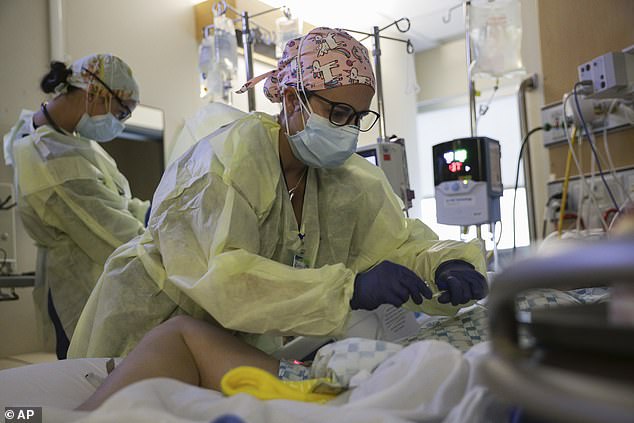
The monoclonal antibody treatments are most effective when utilized early in a patient’s infection – helping them stay out of the hospital. Pictured: A critical care nurse treats a Covid patient in Coeur d’Alene, Idaho, in September 2021
Monoclonal antibodies have become an increasingly popular treatment for Covid in recent months.
The treatment consists of lab-made antibodies, types of immune system proteins that the body typically produces in response to an infection.
Scientists have designed monoclonal antibody treatments specifically to fight the coronavirus.
These antibodies are primed and ready to help the immune system – preventing a Covid infection from turning severe enough that a patient needs to go to the hospital.
The treatment works best for people who are early in their disease progression, meaning they recently tested positive for Covid.
The HHS particularly recommends that patients seek out this treatment if they have underlying conditions putting them at higher risk of severe symptoms.
As Covid cases spiked during the Delta surge, demand grew for monoclonal antibodies.
Demand is particularly high in states with lower vaccination rates, such as Florida and Texas.
In Florida, Governor Ron DeSantis has endorsed the treatment, setting up state-run sites where patients can get monoclonal antibodies – while blocking vaccination and mask requirements.
At a press conference Thursday, DeSantis’ office said that over 90,000 monoclonal antibody treatments have been provided to patients in the state of Florida.
In fact, 70 percent of orders for this treatment have come from just seven southern states, according to CNN.
Those states are Florida, Texas, Mississippi, Tennessee, Alabama, Georgia and Louisiana.
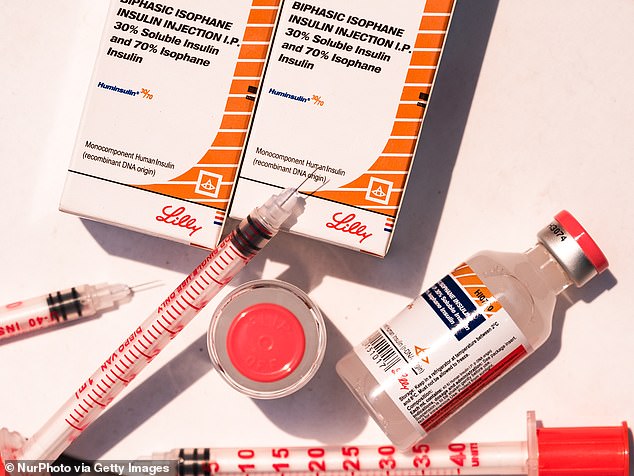
The HHS is now controlling supply of monoclonal antibodies to ensure all states have access to the treatment. Pictured: Eli Lilly’s treatment, photographed in India in April 2021
Since monoclonal antibodies became widely available in the U.S., 2.17 million doses have been shipped to healthcare sites, the HHS told CNN.
As of September 10, about 938,000 doses of the treatment have been used – accounting for about 43 percent of all the doses that have been shipped out.
‘Given this reality, we must work to ensure our supply of these life-saving therapies remains available for all states and territories, not just some,’ an HHS spokesperson told CNN.
‘HHS will determine the amount of product each state and territory receives on a weekly basis. State and territorial health departments will subsequently identify sites that will receive product and how much,’ the spokesperson said.
‘This system will help maintain equitable distribution, both geographically and temporally, across the country – providing states and territories with consistent, fairly-distributed supply over the coming weeks.’
This federally-determined system is a change from the previous process for ordering monoclonal antibodies, in which each administration site could order the treatment directly.
Now, the HHS is directly allocating treatments to states and territories – similarly to the government’s process for allocating vaccines earlier this year.
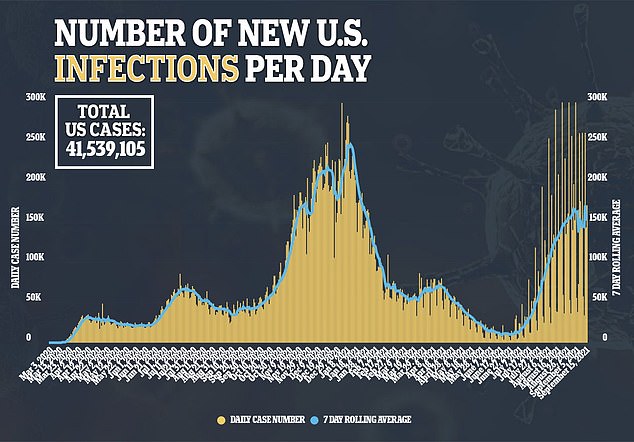
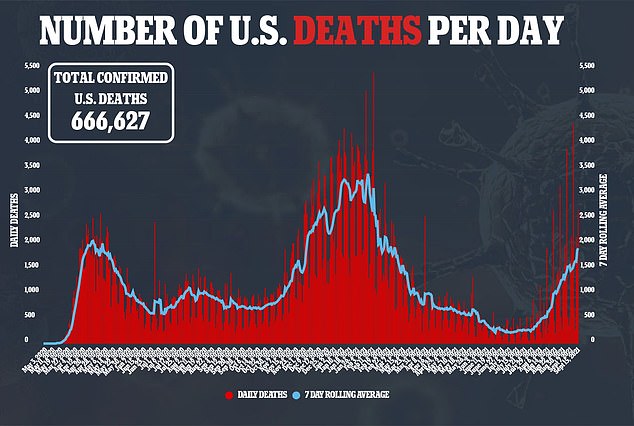
The HHS has also responded to monoclonal antibody demand by purchasing more doses of the treatment.
The Biden administration has contracted with Regeneron for 1.4 million doses of its monoclonal antibody treatment.
Previously, the U.S. bought 1.6 million doses from Regeneron.
In addition, the administration has purchased 388,000 doses of a similar treatment produced by Eli Lilly.
Eli Lilly is expected to ship 200,000 doses in the third quarter of 2021 with the rest in the fourth quarter.
Meanwhile, Regeneron will ship its additional doses by the end of January 2020, the company said.
Regeneron’s treatment costs $2,100 for a dose – so 1.4 million doses add up to a total price tag of $2.94 billion for the U.S. government.
Meanwhile, one dose of the Pfizer vaccine costs between $15 and $20.
Moderna’s vaccine is even cheaper for the U.S. government, since the vaccine was partially funded by federal institutions.
In other words, preventing Covid with a vaccine is about 100 times cheaper than treating it with monoclonal antibodies.
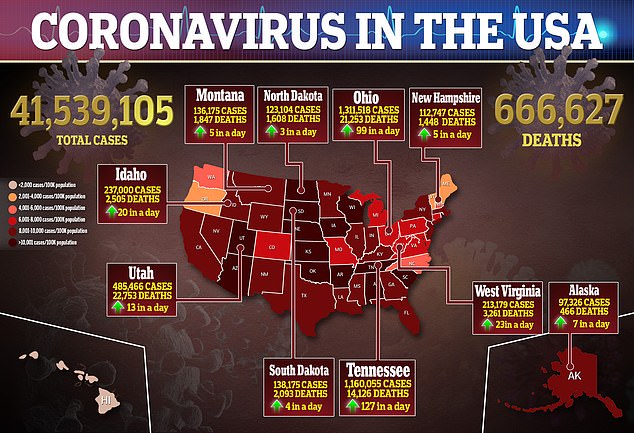
Source link : https://www.dailymail.co.uk/health/article-9999463/Seven-states-accounted-70-orders-monoclonal-antibody-Covid-treatments.html











